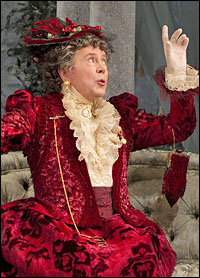
*
The kettle's on, shrilly whistling up a welcome to the company that's come for a little tea and enlightenment. Such is the custom in English homes, and Brian Bedford is observing it — even if his true home is on the other American coast in a tiny hamlet outside Santa Barbara. For now, and for weeks to come, home is a Lincoln Center high-rise with a breathtaking, panoramic view of city lights and the Hudson River.
The star of the film "The Pad and How To Use It" has, indeed, arrived. This is precisely the sort of room at the top you would want for a classical actor at the top of his game.
At a loss where to luxuriate without the distracting view, we settle into a breakfast nook where there's a caricature of him in the role he is bringing from the Stratford Shakespeare Festival to Roundabout's American Airlines Theatre — the formidable Lady Augusta Bracknell in Oscar Wilde's The Importance of Being Earnest.
"I think I look like Brooke Astor," he throws out thoughtfully, but the truth is the caricaturist has caught him looking exactly like Edith Evans in the definitive, cinematized Earnest of '52. "Not really," Bedford begs to differ, gesturing here and there on his own face, "Edith had one eye down here and one eye up here." He continues, "I thought the film was probably the best version of it that I've seen, in spite of a few things like [Michael] Redgrave being too old. But he was very, very good. You know who were incredible in that? Margaret Rutherford and Miles Malleson as Miss Prism and Chasuble. In our production, we've got to watch ourselves because we've got Dana [Ivey] and Paxton Whitehead. They'll probably be as good — in different ways."
No, he answers fast and emphatically, it's not a role he always wanted to do — his only role in drag was at age 14, playing the Virgin Mary in a Christmas nativity scene at a Catholic boys' school — but for a classical actor, after Lear, what's left?
Des McAnuff, Stratford's new kingpin, suggested Bedford be Bracknell — and director of Earnest as well. The resultant 2009 production elicited hosannas heard over the border by Roundabout's Todd Haimes, who invited him down to repeat his two-hat trick with an American cast. The high-strung quartet at the heart of the farce — boys who wanna be Earnest, and girls who gotta have Earnest (or Ernest, to be honest) — are dispatched by Santino Fontana, David Furr, Charlotte Parry and Sara Topham.
 |
||
| Bedford in The Importance of Being Earnest |
||
| photo by Joan Marcus |
His classical bent came from the RADA extracurriculars. "The great benefit of being in London at theatre school was really seeing great actors in really great plays. I developed a taste for classical theatre, and that's what I've spent my life doing."
Classics "R" Bedford. He's gotten Tony nominations for his last five Broadway outings: 2003's Tartuffe, 1997's London Assurance, 1995's The Molière Comedies (a double bill of The School for Husbands and The Imaginary Cuckold), 1993's Timon of Athens and 1992's Two Shakespearean Actors. In 1971, The School for Wives won him his only Tony and one of five Drama Desk Awards (the others were for 1974's Jumpers, 1969's Private Lives, 1968's The Misanthrope and two of the above). His Obie is for 1964's The Knack, something he had when he got here in 1959.
The first of his 18 Broadway performances was in Five Finger Exercise 51 years ago. "It was Peter Shaffer's first play — an autobiographical play, so I actually played Peter — and the director was John Gielgud. John was a mentor of mine — and a very close friend, right up to when he died at the age of 96. I called him every year on his birthday, and on his 93rd, I said, 'How are you, John?' He said, 'I'm great. I've just changed my agent, and I'm getting a lot more work.' And he was serious!
"That's probably why he was so brilliant in The Importance of Being Earnest. His production — what they call 'the black and white production,' which happened in '39 — is touted as the production. I remember John telling me the secret: 'The way into The Importance of Being Earnest is through the seriousness of the actors' approach to it.' That always stuck with me, and of course that's what we did." (This feature appears in the January 2011 Playbill.)










